The first time I was paid actual money for creativity was when I was nineteen - twenty bucks for a cartoon I made for a university magazine. For me this was incredible. Money from thin air! But I had to use it for a bill (they also arrive from thin air).
Anyway, I posted a series of thoughts on creativity on Instagram that had five thousand shares, so I’m elaborating on them here. They will form a small section on art/creativity from the 2nd edition of my book, You’re Going To Be Ok (Because You’re Fucked No Matter What) (March, 2026).
None of these following thoughts came easy, they were all hard earned through all the bad days, years and shitty headspaces when creating didn’t feel like flying, but more like being tied to a rope and dragged by a galloping horse.

This is something I wrote in my early 30s. At the time I though “Can I write this? I’m not old enough to think this yet?” But that’s what I like about my inner-voice: it seems to know something that I don’t - it’s usually about twenty years ahead of me. I’m now 49, prime mid-life crisis, and things haven’t changed.

Starting anything creative is a slog. 90% of what I write (and no one will ever see but me) is crap. That means I’m constantly down 9 to 1. So I’m forever playing this creative game from a losing position and trying to ‘win’. But I can’t let creativity smell my fear or nothing happens.
Creativity is always born against all odds, between the cracks. It’s a miracle that something can come from nothing. But then there’s another problem: it’s addictive and hard to stop.
And on finishing takes style? Good comedy writing catches the thought behind the thought. Good philosophy catches the thought behind the thought behind the thought. And the thought behind the thought behind the thought behind the thought? That’s the land of the insane. But one more thought-step and it loops back in a circle to the first thought, now so self-aware, it becomes delusion. And that’s where bad poetry writes itself. I’m guilty.
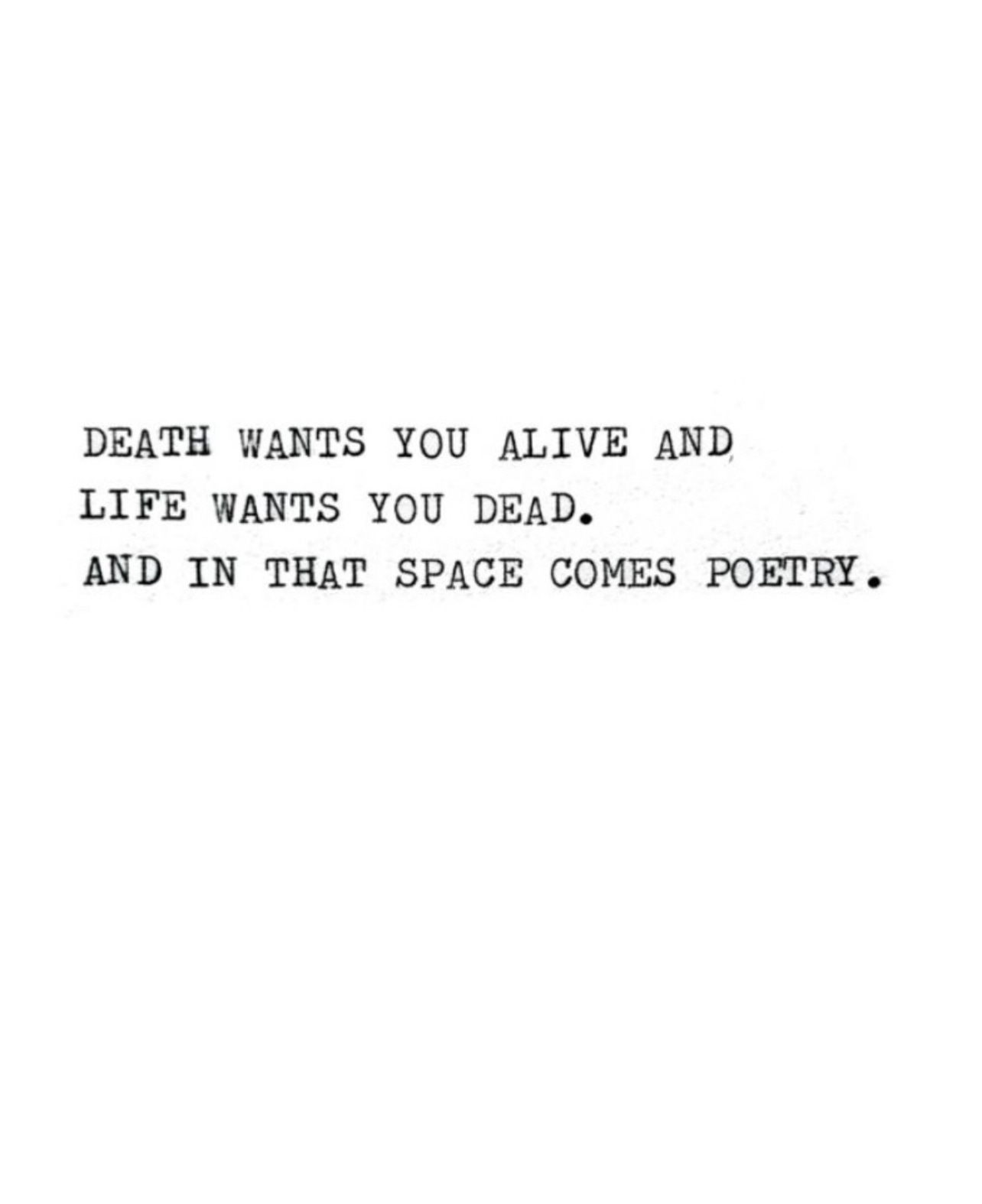
When I was 20 and moved house, I remember the feeling of the new place like I was squatting in someone else’s life. So I opened an old favourite book and began reading. And each time I looked up from a turned page, it was like the words were building a sense of home in the echo of a barely furnished room. It made me believe a culture’s dreams were rented, but stories were ours to keep.
All I know is I’m only as alive as the last true sentence I write and its oxygen lasts for about a day. I’ve felt like this for years. What a dumb contract a writer enters into: constantly saving myself from nothing.
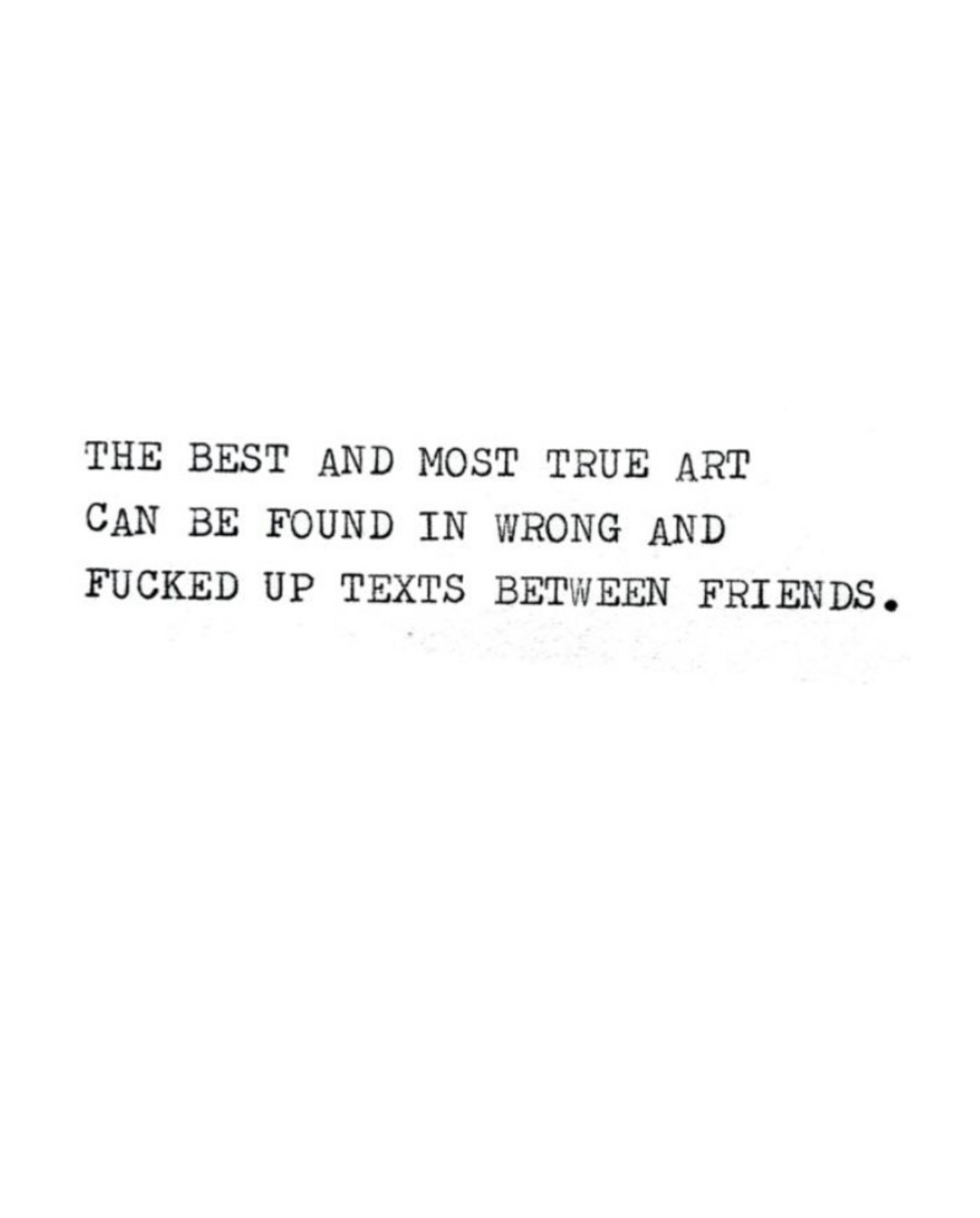
Nearly all art in the public domain is just moral fast fashion, borderline propaganda, parading around like it’s the walls of our reality. What’s ‘right’ today will be proven ‘terrible’ and ‘wrong’ tomorrow. My favourite artists step beyond this limited editorial stuff and are about thirty years ahead of the culture. And if culture generally works in twenty year cycles, they’ve already broken free.
The smaller and more specific your audience, the more widely it will resonate. Mum’s book was a conversation between me and her, and as a self published book it sold 5000 copies in six weeks. That was weird. But as Carl R Rogers says, “What is most personal is most universal.”
But my favourite art is saying the most fucked up stuff in text to my friends and laughing hard, like throwing open a window in a stuffy room. And as a bonus, unsharable thoughts can lead to interesting ideas that can be shared more widely. Sometimes, in the worst, most wrong thoughts and ideas, a light emerges that can’t be found anywhere else.
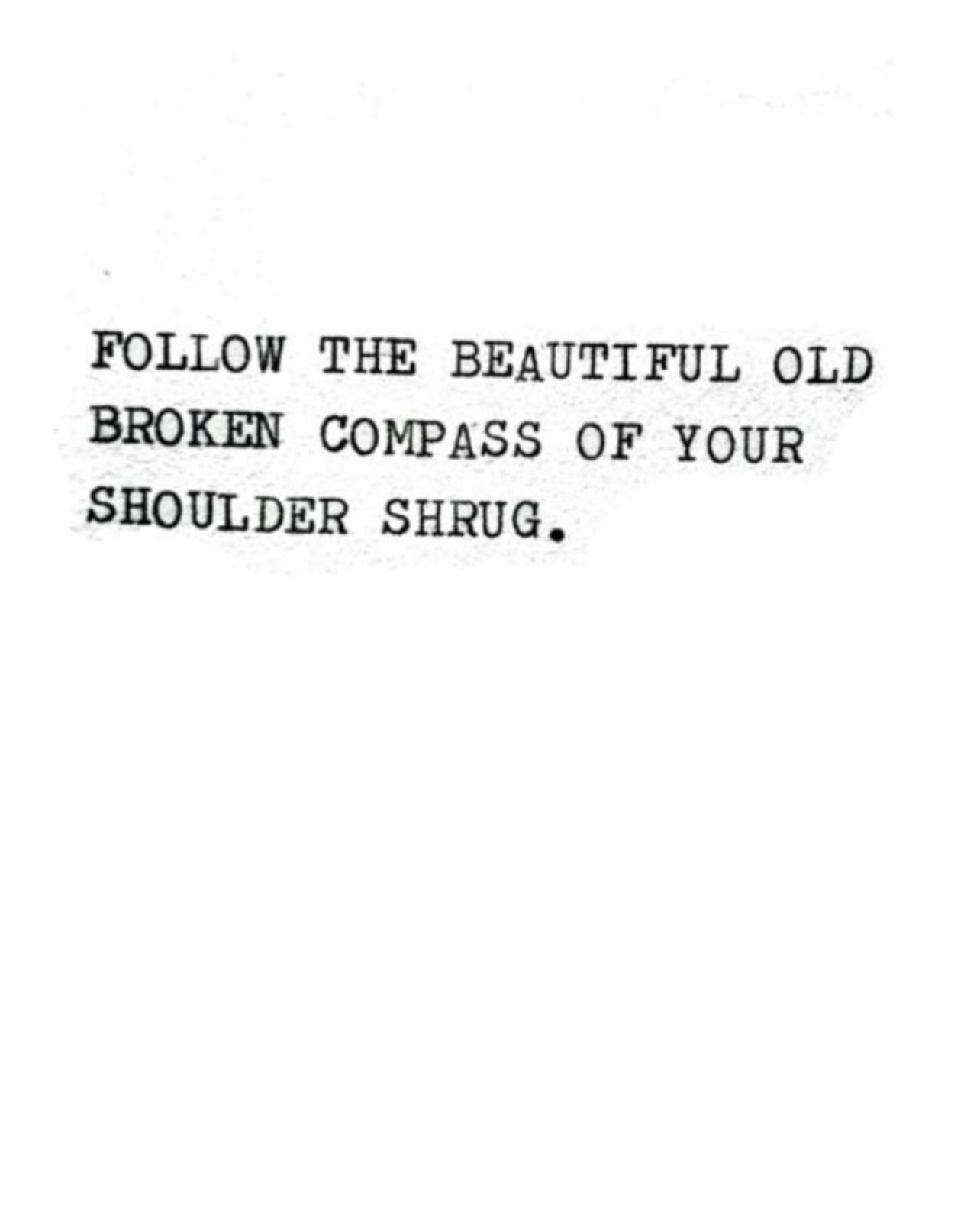
As an artist, you spend years collecting strange, misshapen bricks. Each one baffling to others, seemingly useless, even to you. You look like a fool, stacking nonsense. Then, one day, people notice it’s a castle. They rush to fill it, celebrate it, claim it. But by then, you’ve already moved on, somewhere else, once again looking ridiculous because instead of using bricks, now you’re using chewing gum and sticks. Because nearly every institutional tool for measuring truth and meaning fails the moment it’s confronted by the unknown, magic parts of yourself. You’ve gotta follow your divine dumbness, it’s the smartest thing you have. My whole life I’ve had no fucking clue what I was doing, but it was in the right direction and that was all that mattered.
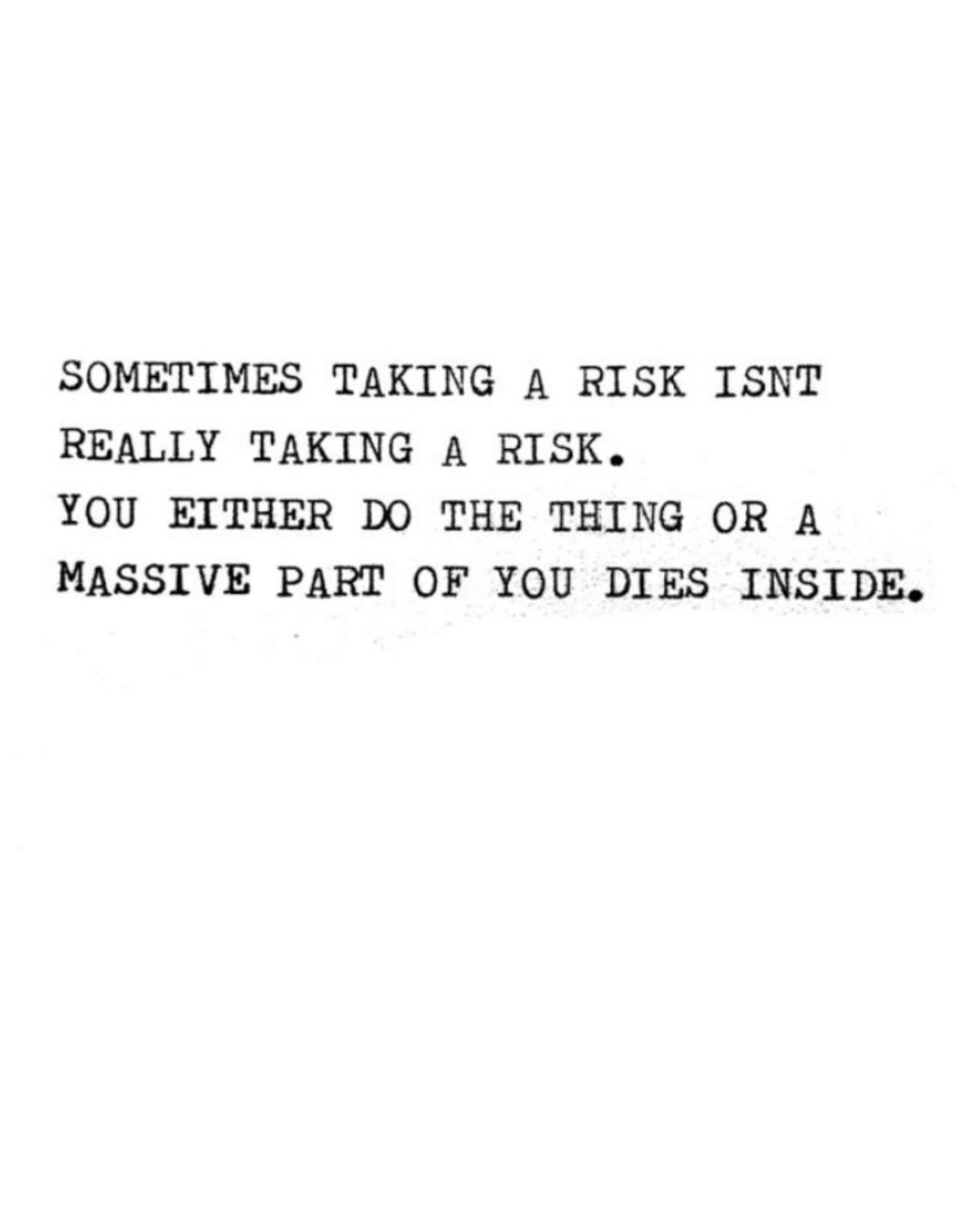
This feels so excruciatingly self-evident I was nearly embarassed when I first posted it a few years ago. But sometimes the most obvious things need to be said again and again.
I tried really hard in my first proper job for a whole week. By the end of the week I sat in the work toilets and had a panic attack, thinking, “I can’t do this for the rest of a life.” Something was dying inside of me in just a week. All jobs since I have saved the best parts of myself for creativity, rarely for the job.
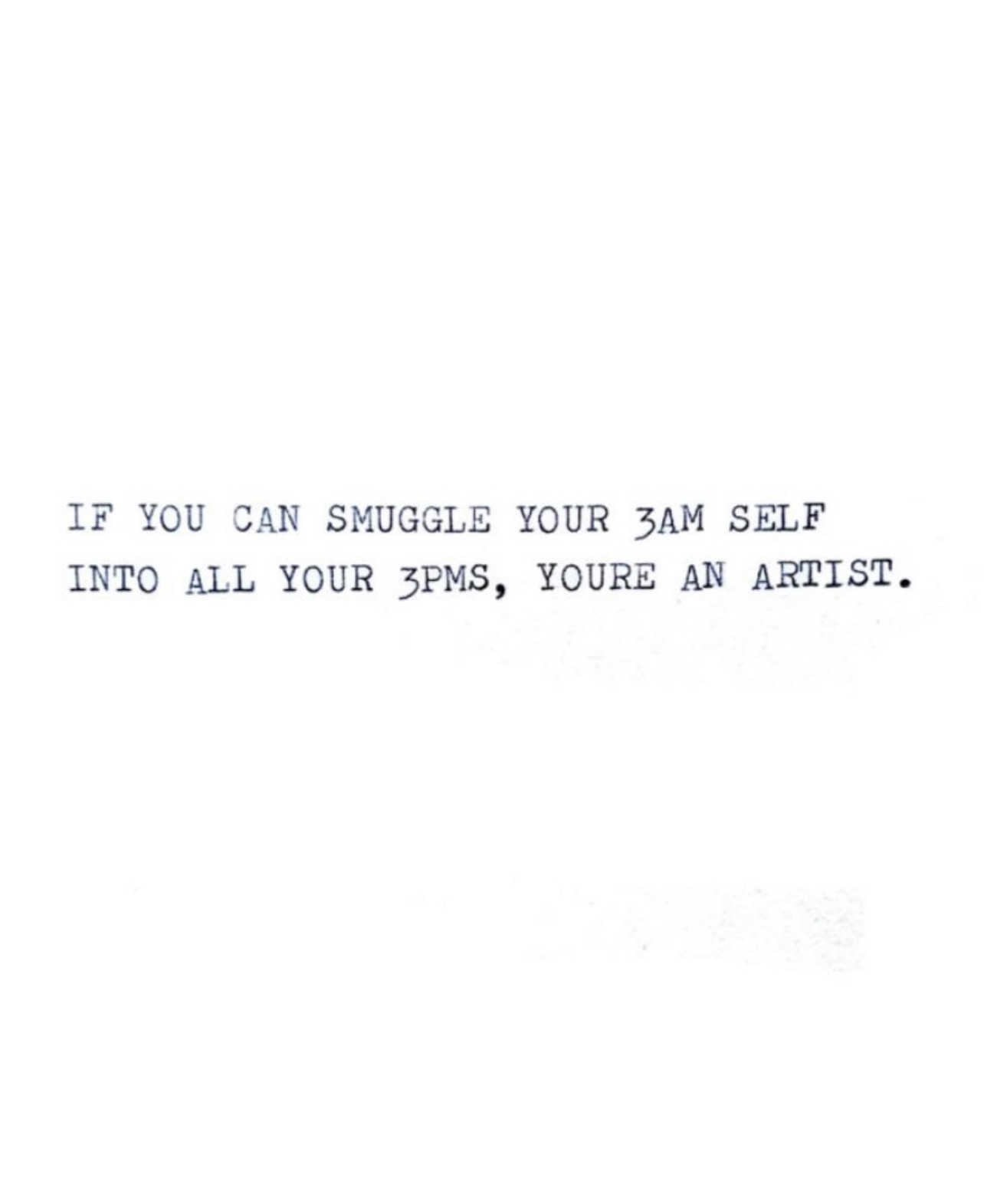
Humanist stories and art have mostly disappeared. You know, the one’s where we all share the same eternal feelings of the heart at 3am, not the politics of the head at 3pm?
3pm is the farthest point from the shore of your bed - stranded between morning and night, and you can’t see straight. Caught in the fashions and news of the day. Most people seem to build entire lives and art careers in and on their 3pm.
I’ve heard a lot of writers say they write their best stuff first thing in the morning while still caught in the vapour of dream. And some write best late into the night when there’s an electric calm that spreads across the land.
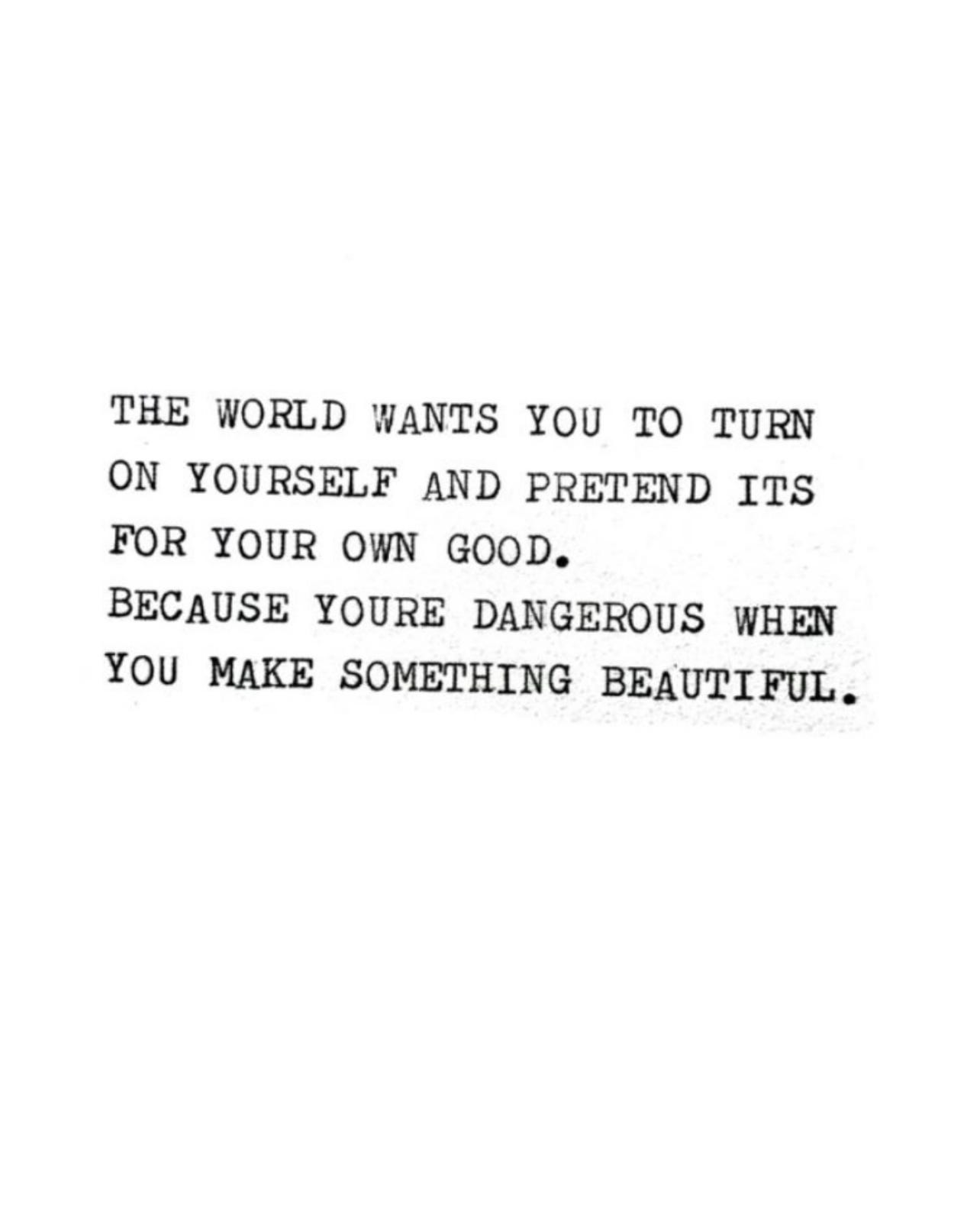
Bills keep you in check. Because to pay the bills you have to get a job. And to get a job you have to behave in certain restrictive ways. And if you don’t behave in certain ways, you won’t have a job, to pay your bills to stay alive. So when you do anything sideways (creativity) you’re seen as dangerous. And if you make something truly creative, you can’t be controlled and you just might stir other’s hearts.
PS. I once framed a bill as ‘art’ and sold it for the amount due.
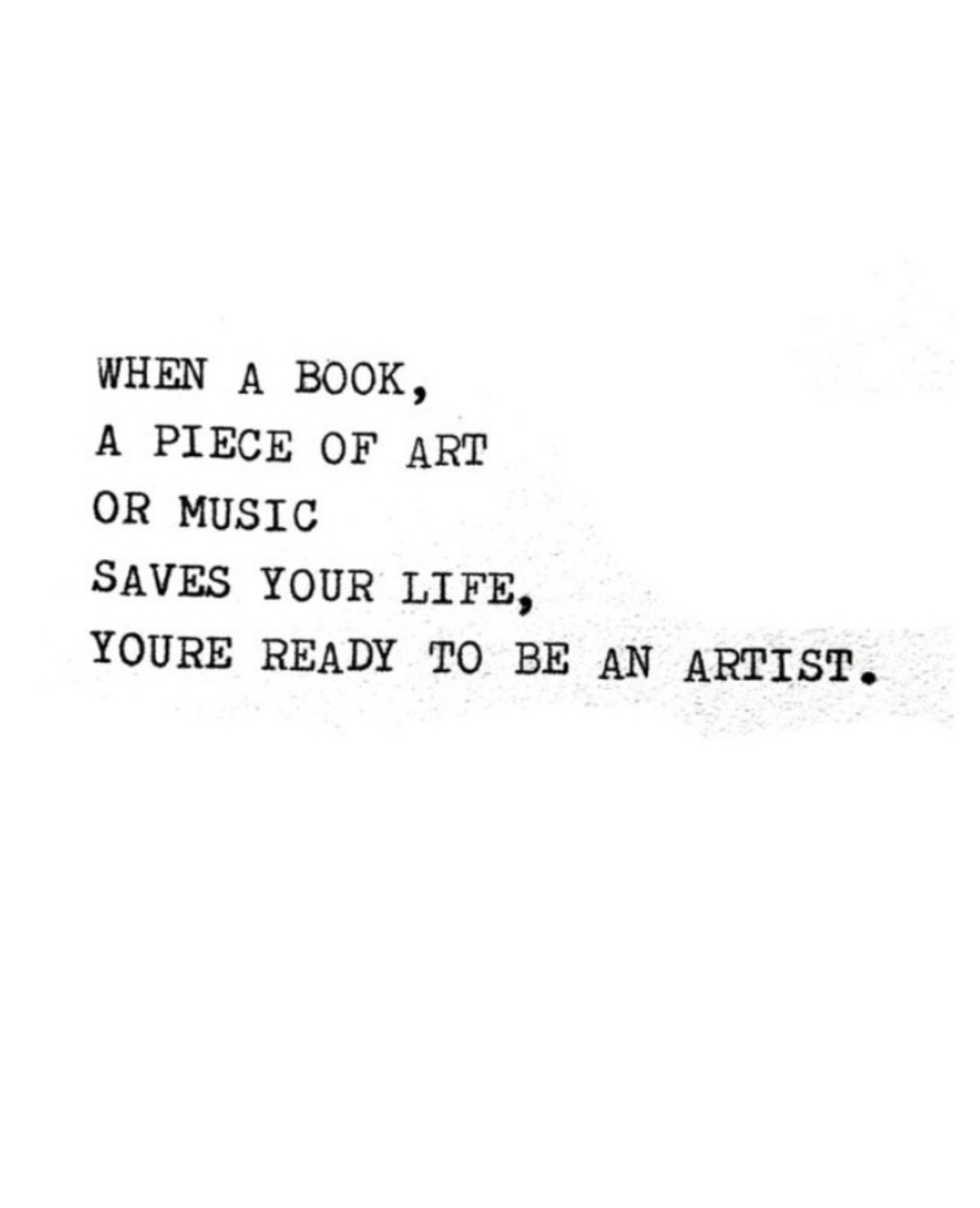
Comedy in my twenties helped me undestand the world, and poetry in my thirties helped me understand my heart in this world. Comedy finds the shared experience of our reality, but poetry felt like something vital - medicine. My favourite works of art combine the two - comedy and poetry. They shake me out of my sleepwalking when I feel dead inside, and they made me want to stick around longer. I thought I’d like to try and write my own medicine in my late 30s.
I’d also add to this: when your favourite pieces of art no longer resonate, you’re ready to build your own world.

I’m always writing my way out of terrible moments. Every journey through the swamp of the heart and desert of the brain I’ve eventually spun into gold. Sometimes this has happened immediately, sometimes decades later. Like mum’s book - mum wasn’t an easy mum, I was basically her parent as an eight year old. I’ve done life in reverse: I was an adult in my childhood and kid in my adulthood. But I don’t regret my childhood and I knew I could only be shitty about it for only so long before I wanted to spin it into beauty with Darby, Love…
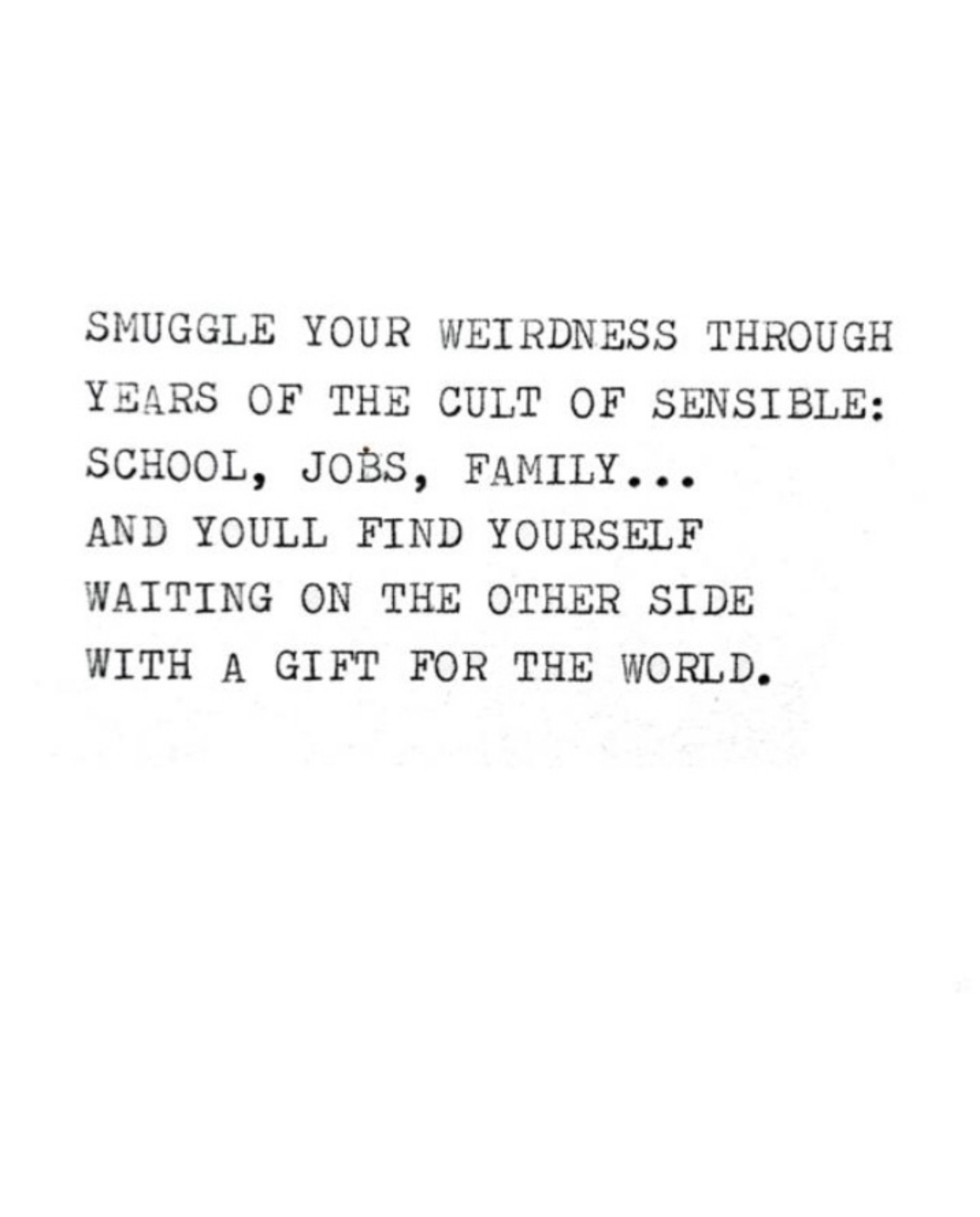
My university lecturer once wrote in red pen on my essay, “Pseudo philosophical waffle”. A boss who employed me once said to me in a performance review, “What are you even dong here Darby? Shouldn’t you be under a bridge writing poetry?”. In my 20s, my peer group related to one another by not taking themselves too seriously. If I took myself seriously, I was shot down. But I had very serious thoughts and ideas that were interesting to me and no one else. Sure, it’s insufferable when someone takes themselves too seriously, who’d want to be around that? But I noticed this ‘not taking oneself too seriously’ became an act for many. It’s part of Australian culture. Earnestness is side-eyed and if you have any success, it better be “an accident”, or else.
In my twenties, my thoughts and ideas didn’t fit in with my peer group at all. So I developed my version of a sense of humour almost to camoflage my very serious side, make myself palatable to the world and undertake the dreaded process of ‘fitting in’. It was decades later I realised the people I knew who ‘weren’t taking themselves too seriously’ had only been fitting the whole time - and in the process, they’d suppressed and killed off some essential and unique part of themselves that might have been valuable to the world. Now they’re into their 40s and some nearly 50 and are still stuck in twenty year old mode. The shame of not fitting in is huge. You have to be shameless.
Into my thirties, I felt shameless and began to either lose friends, or not spend as much time with them to develop this part of myself that needed to be expressed. The older you get, the better you know yourself, the fewer friends you have. No longer lost in that hall of mirrors. And that’s when the good writing begins - singular, sharp and true.
Comedy helped me understand the world in my twenties, poetry helped me undertand my heart in the world in my 30s. Of course I still love funny shit, but I needed to take the time to develop that poetic side which ostracised me. At nearly fifty, I’ve come full circle and combine my weird sense of humour with poetry.
My true side was unpalatable and weird for decades. It took me thirty years to smuggle my strangeness through the cult of sensible. And what I didn’t know twenty and thirty years ago was that I was going to grow into this voice.
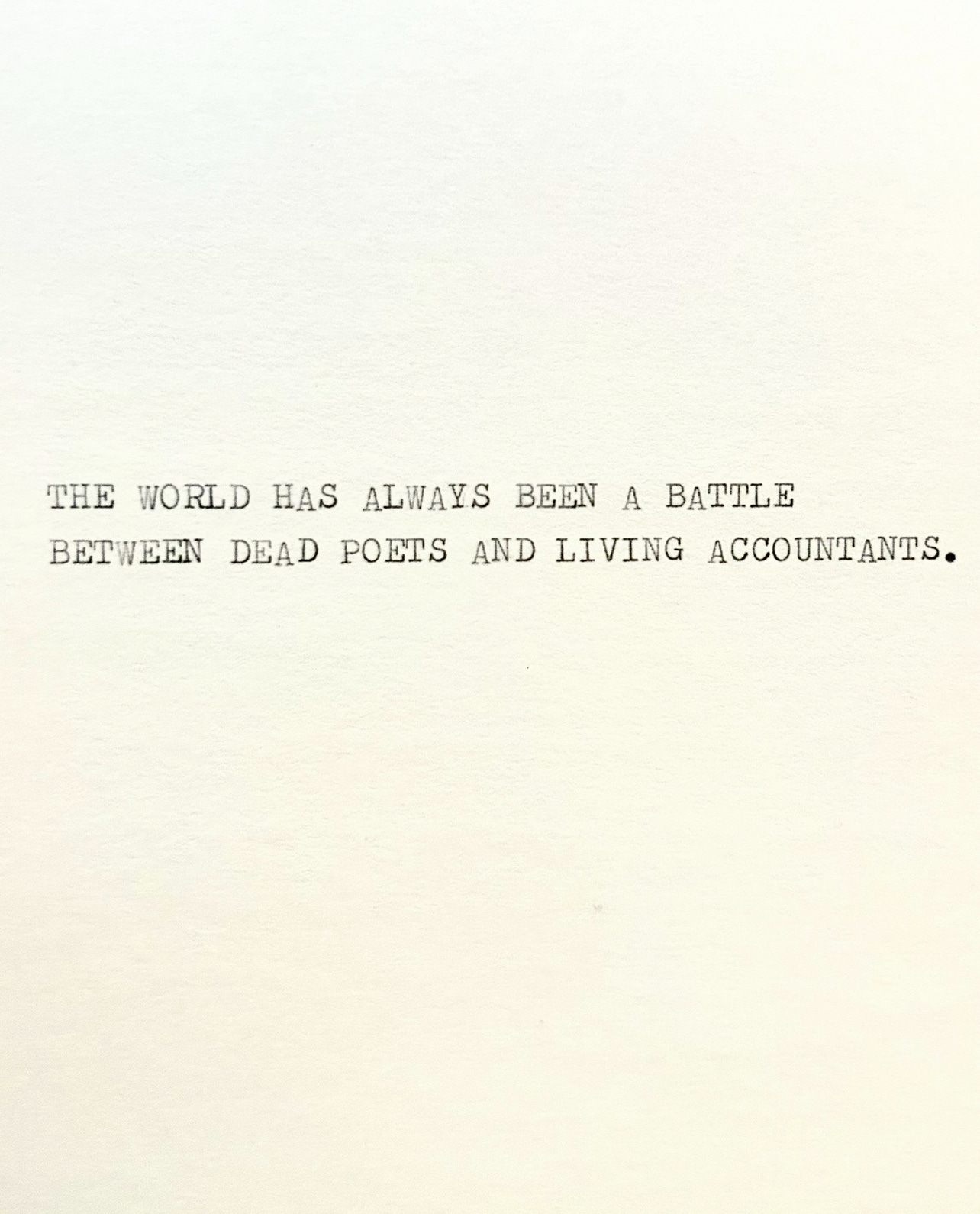
Many modern poets are really just accountants. Not only have they listed and accounted for all the types of silences and star metaphors, they’ve also ticked all the right boxes, listed all the correct opinions. The dead poets who are still remembered were beyond their time (at the time - at least 30 years ahead as mentioned earlier).
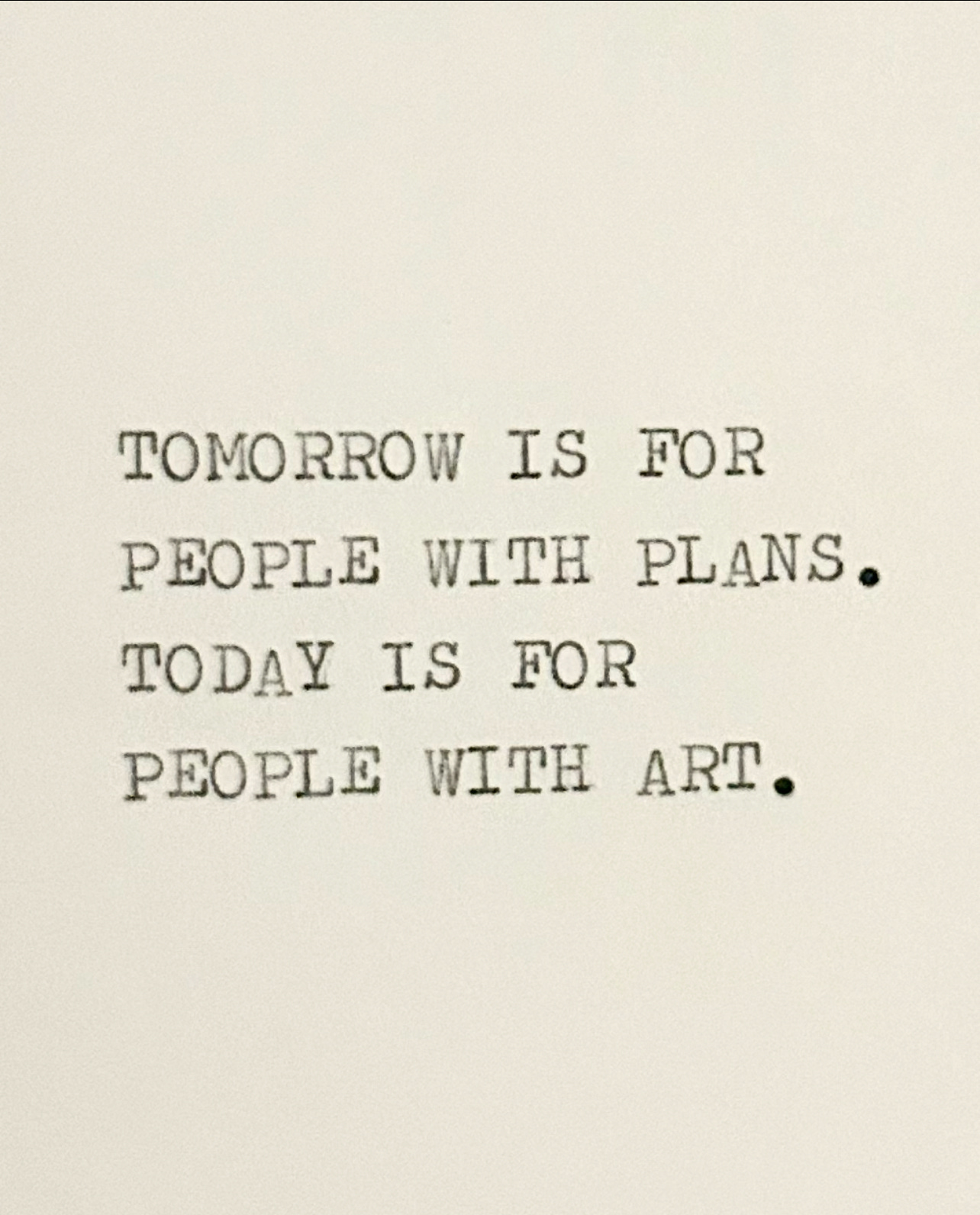
Most people are out there, shining high beams on tomorrow with plans, like they’re gonna live forever in a spreadsheet. Meanwhile, artists are trapped in each day, reaching through the wall of the night into the dark messy uncertainty of tomorrow, pulling out magic then dropping it into today, building just enough hope and oxygen to get them into tomorrow. And to keep the air breathable for the rest of us today.
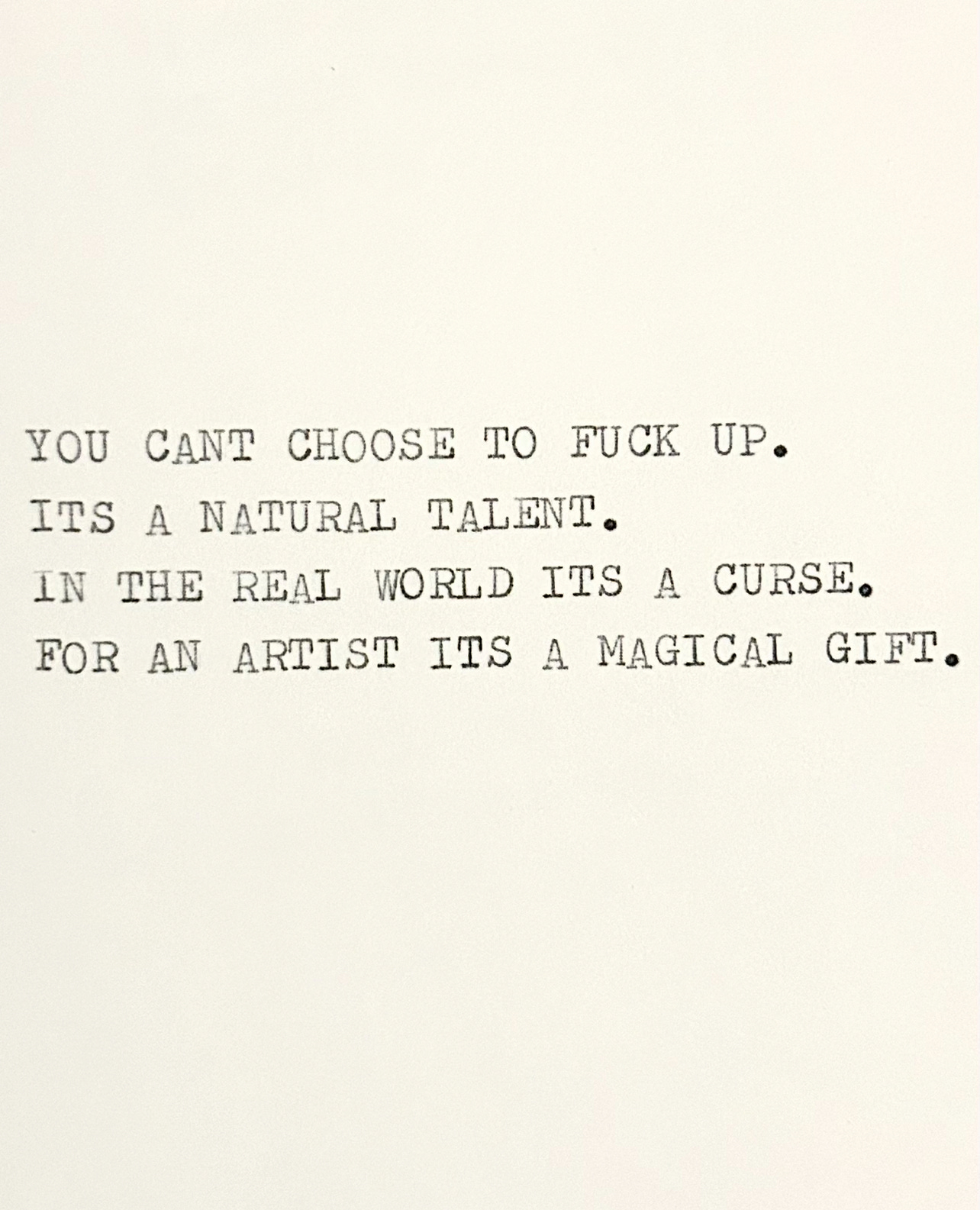
It’s hard to get through a life where you just feel like everything you do is “Wrong! Wrong! Wrong!” I feel like I drove backwards for thirty years to get to where I am. I tried to be born into this world feet first. “Onwards and sideways”, as an artist friend of mine says.
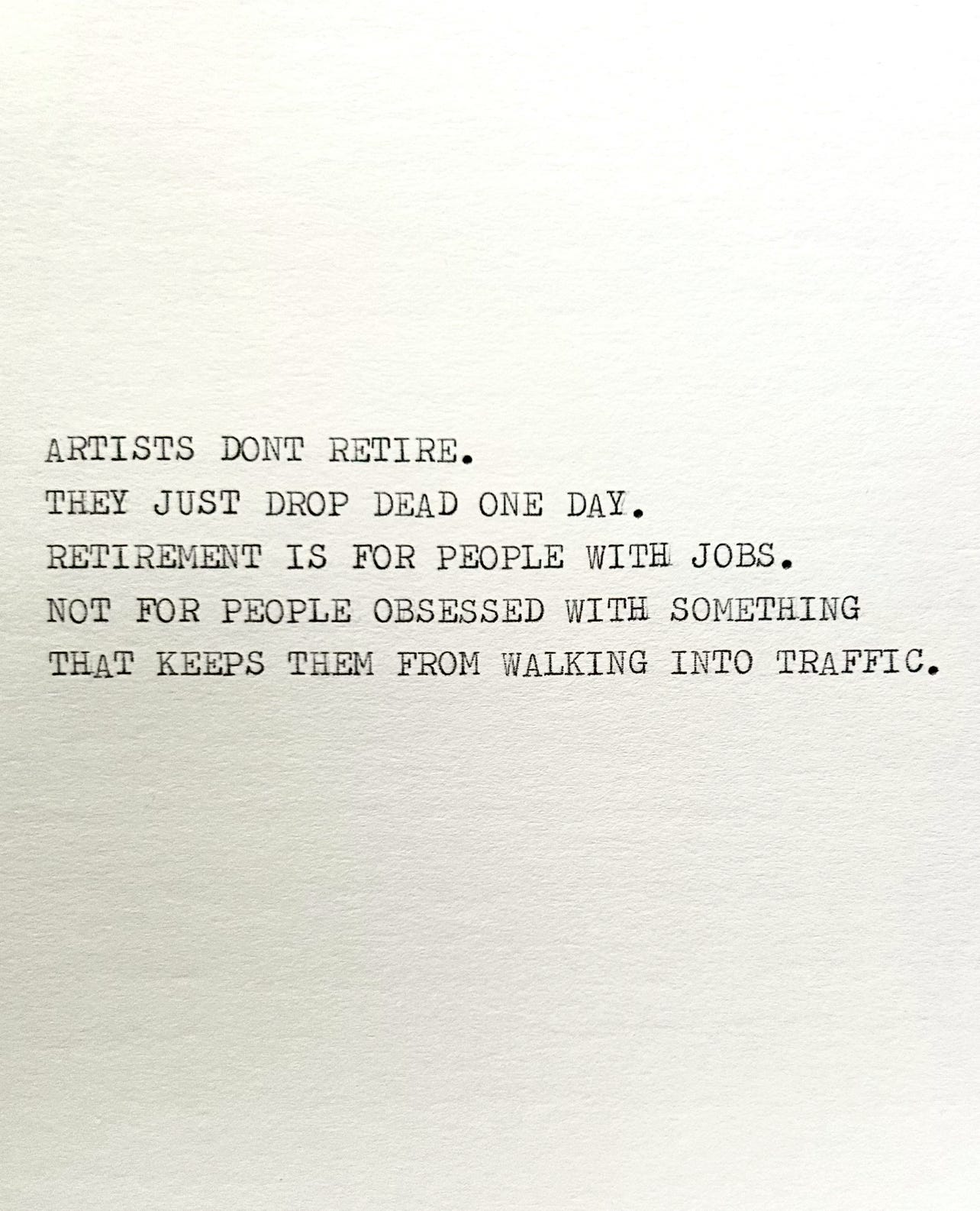
Perhaps this is a bit dramatic, but it feels true sometimes.

When I try to write a poem, it rarely works.
I’ve read a lot of award winning poetry that sounds more like they’ve used the same skill that would have solved a difficult crossword puzzle. I’m guilty of this too sometimes.
In the same way you can’t forcibly tickle yourself, the words that are mine are usually my worst work, and the words I write (that are any good) feel like they come from someplace else.
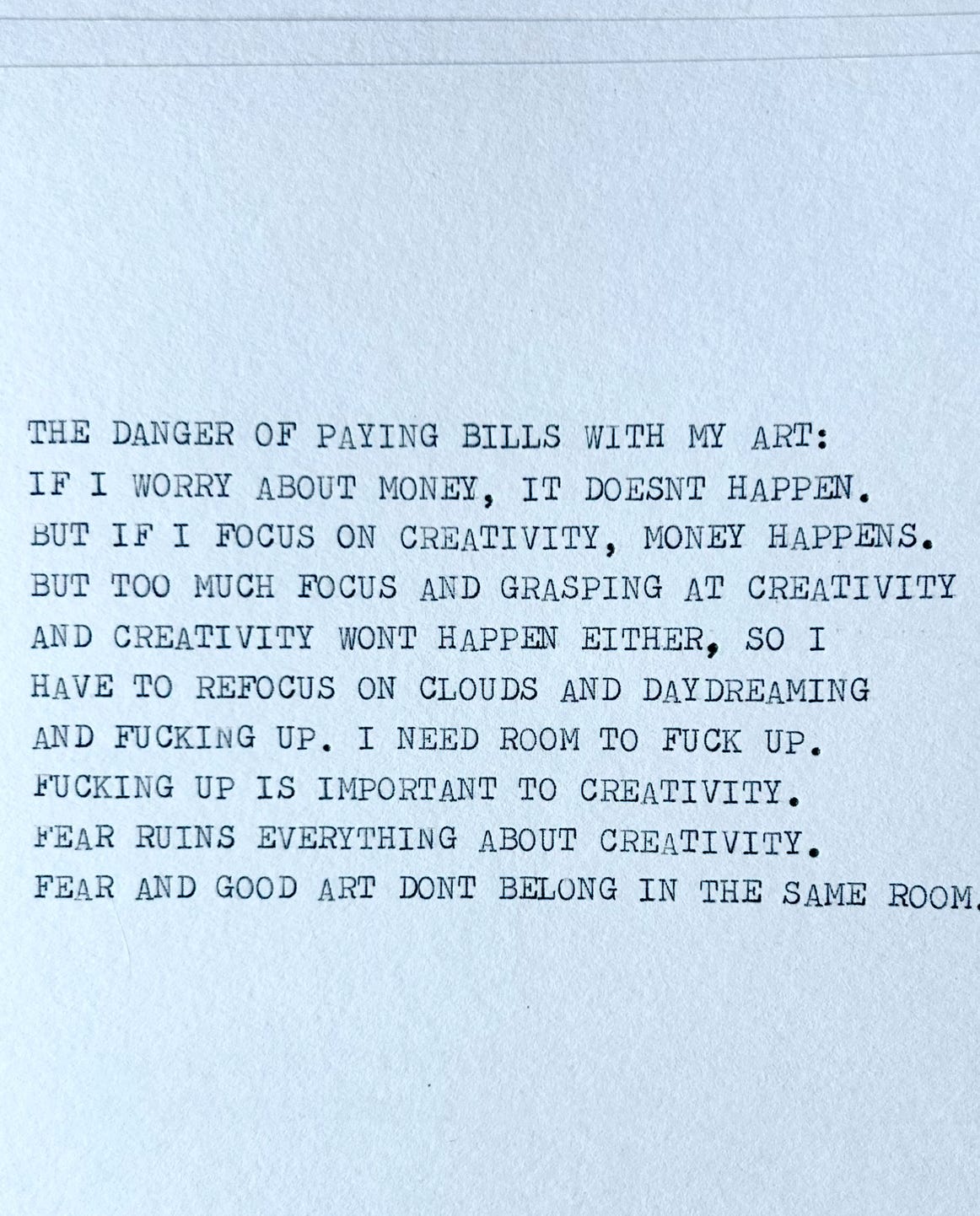
This one’s long enough to need no further explaining. As soon as I need something, I can’t have it. It’s life’s magical rule! This has happened my whole life.
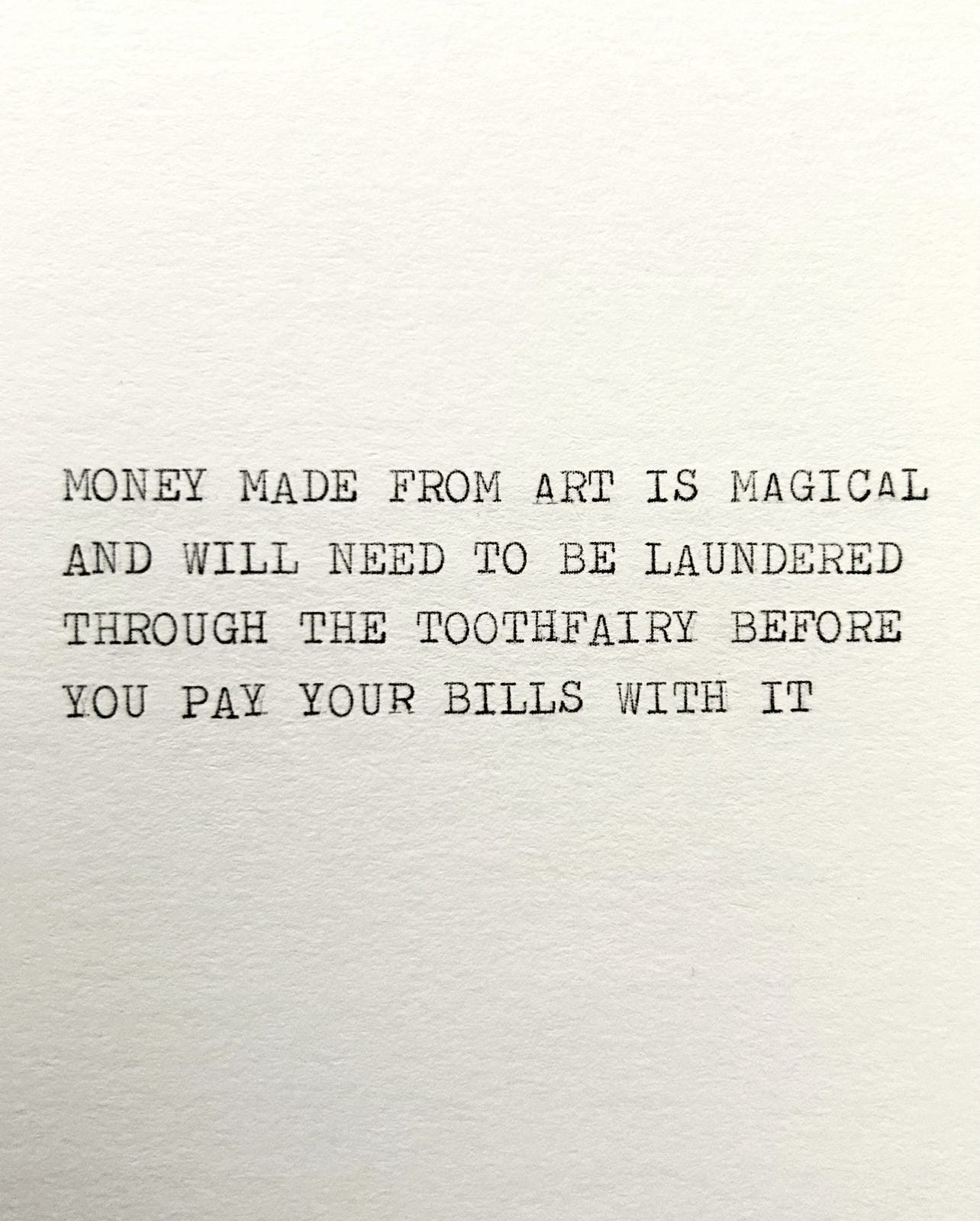
This is a reminder for myself. I often forget the life that my words have beyond me writing them and sending them into the world. Also, I can get caught in numbers: follower counts, books sold, money owing on bills to be paid, time needed, dates. Numbers are a distraction from what is true and real, but the brain gets hooked by them because it loves any sembelance of ‘logic’.
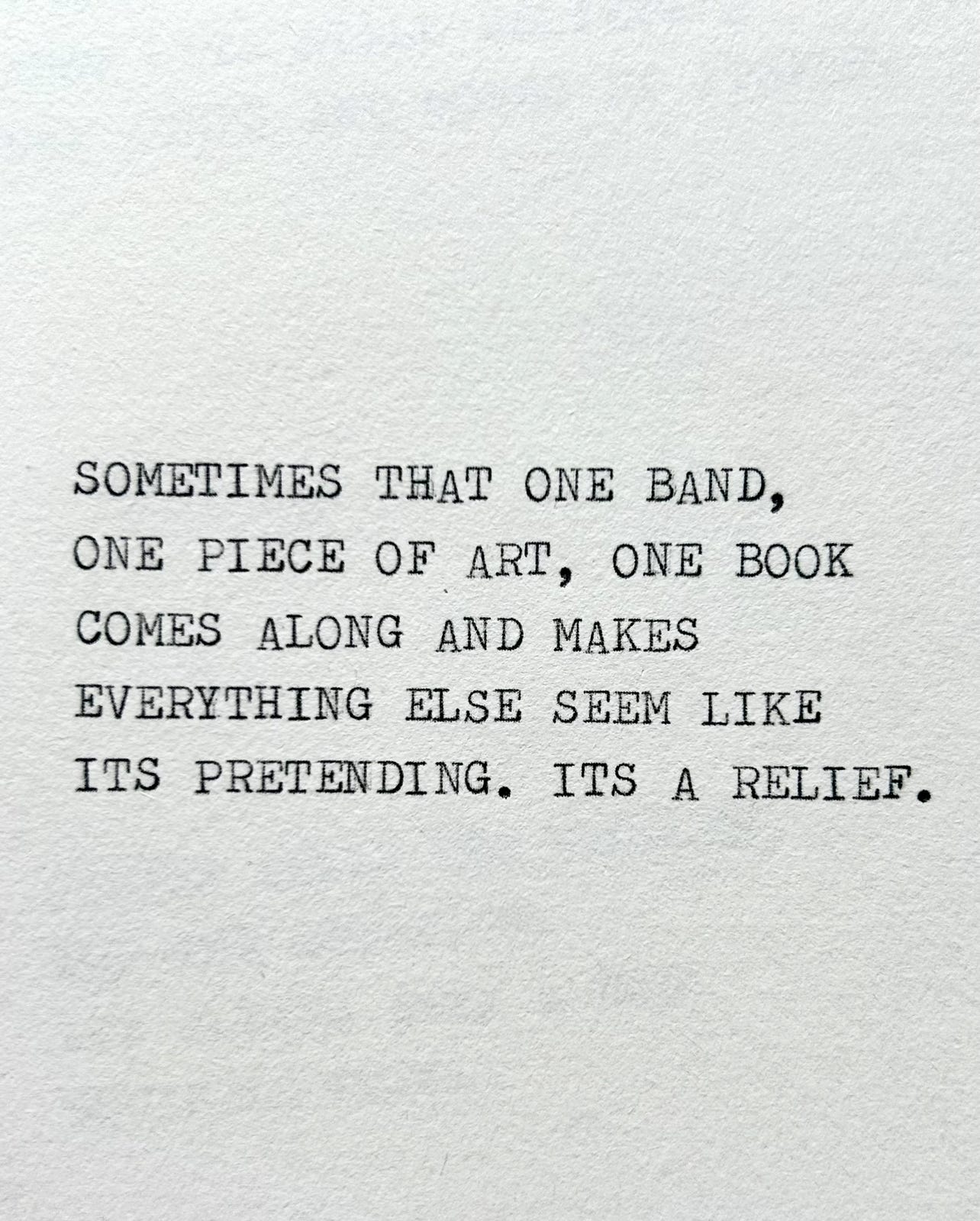
My favourite stuff feels like it breaks through a 4th wall - music, words, art. When I read a book, it’s either poison or medicine. There’s no in-between. And average writing is worse than bad writing, because it’s readable and sneaks its poison into you. You have to drink a lot of poison to find that rare, good medicine. And even better, than medicine, sometimes this art can feel like home.
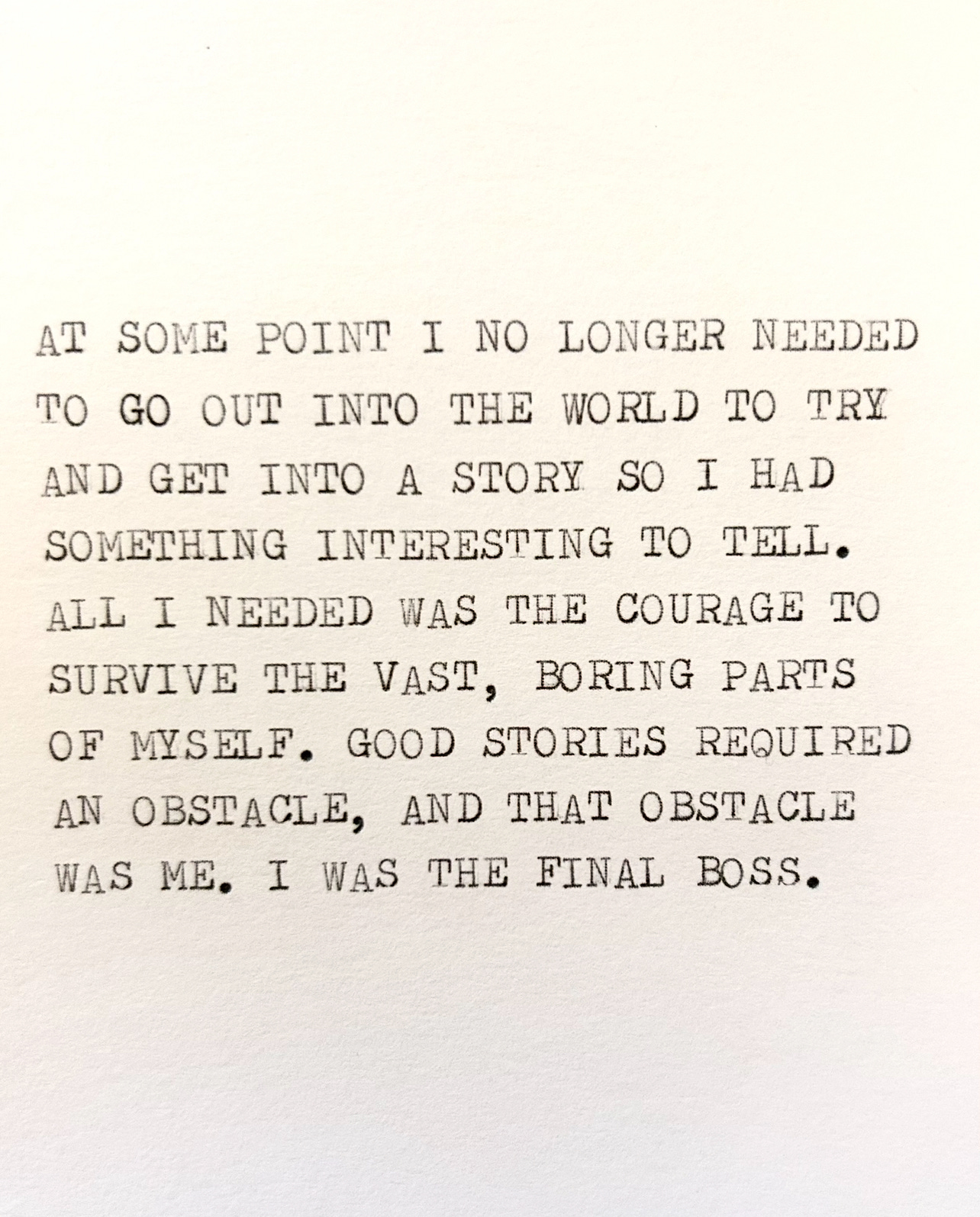
I think as a younger writer or person, it’s handy to go out into the world. Or any age. What am I saying?! But at some point you’re relentlessly faced with yourself - a one way, no return, ticket to yourself. And this is the stuff that everyone has to eventually deal with.
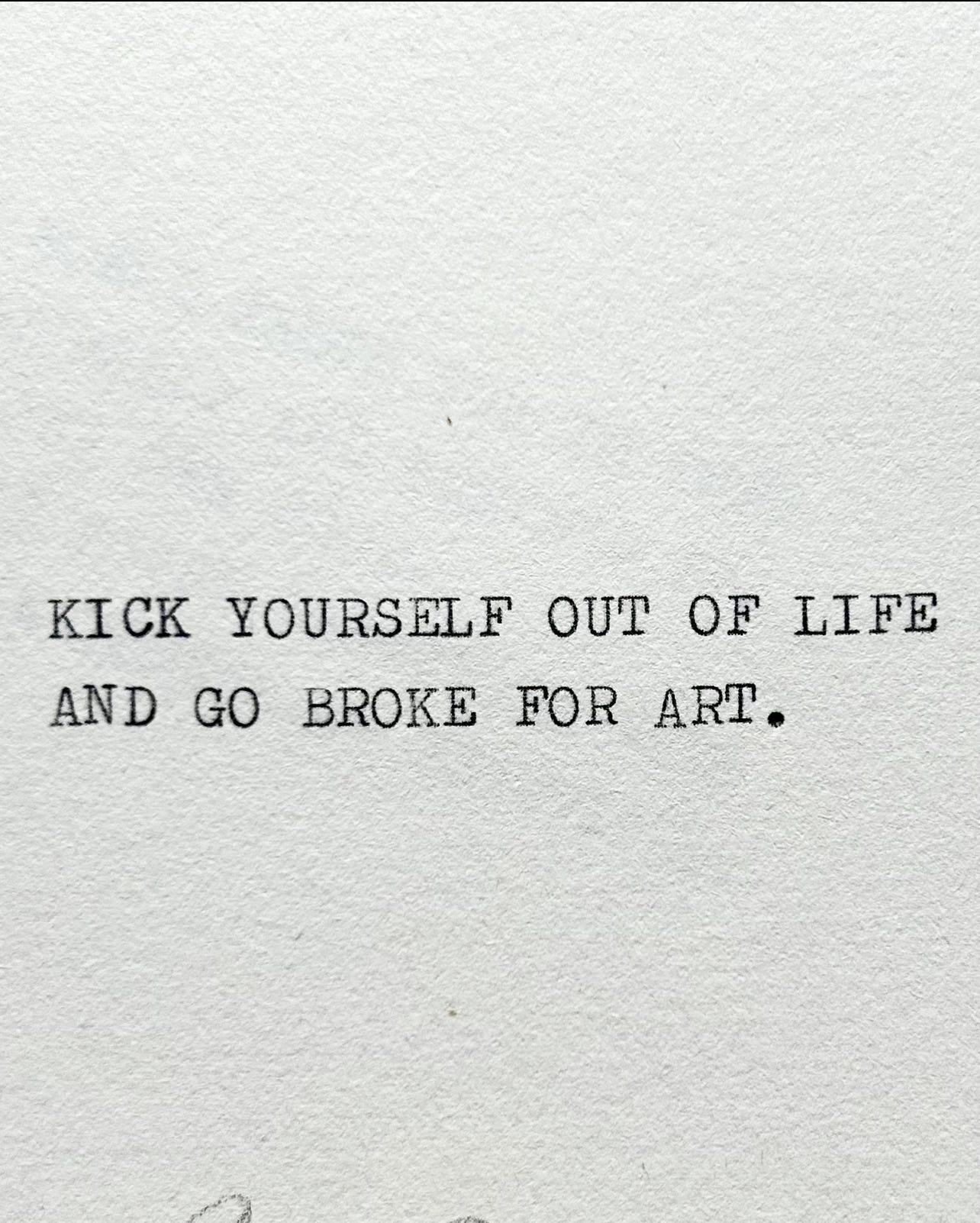
I love how David Lynch talks romantically of The Art Life… There’s a lot of expectation and judgement and peer pressure to stick to certain life-tracks. But it’s your life. Do what you want.
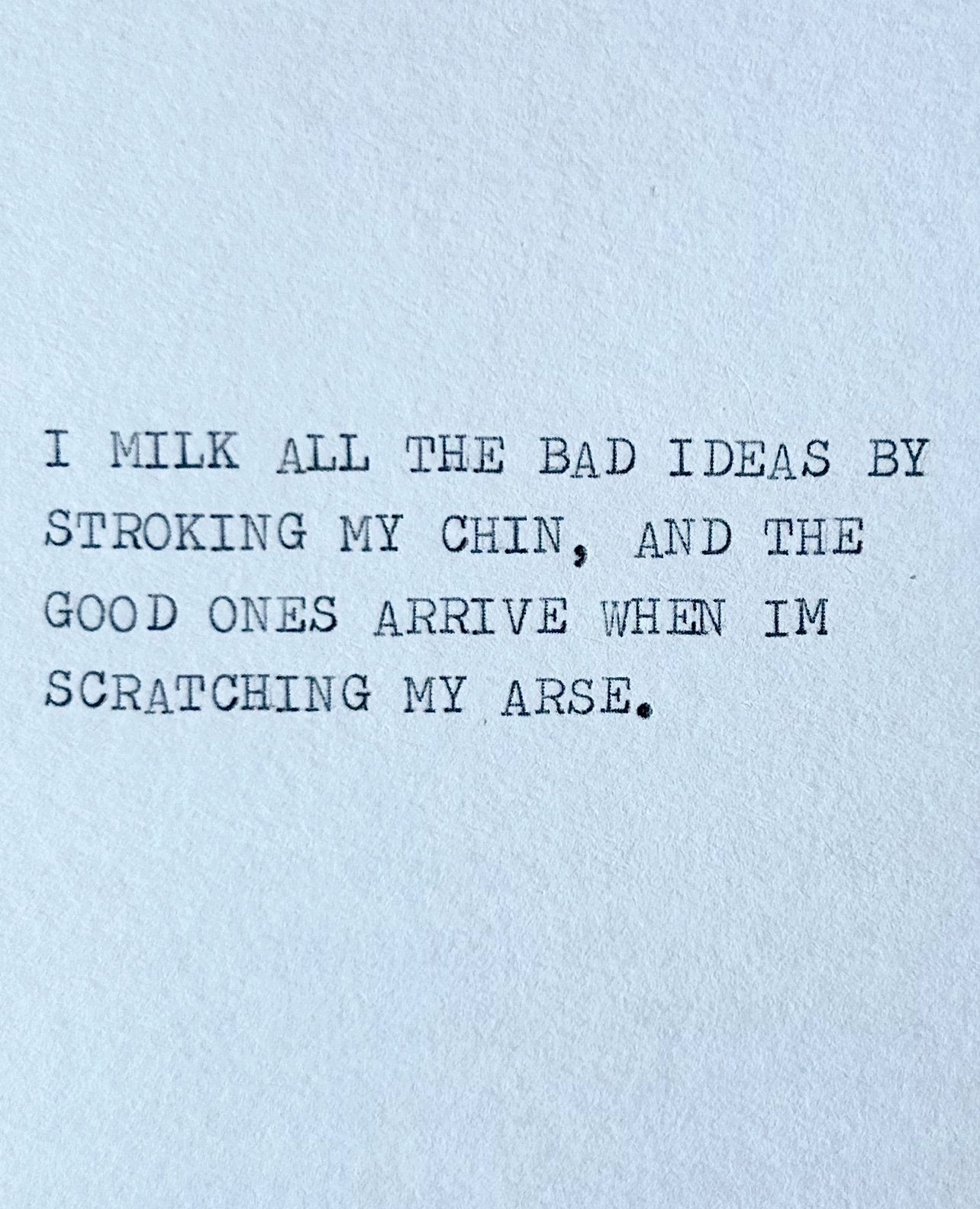
Creativity can be lured out by not caring for it. Relaxing. Blurry nonchelant vision. When I don’t care, the ideas I truly care about turn up. That’s not to say turning up and doing work is pointless, but this is what I’ve found.
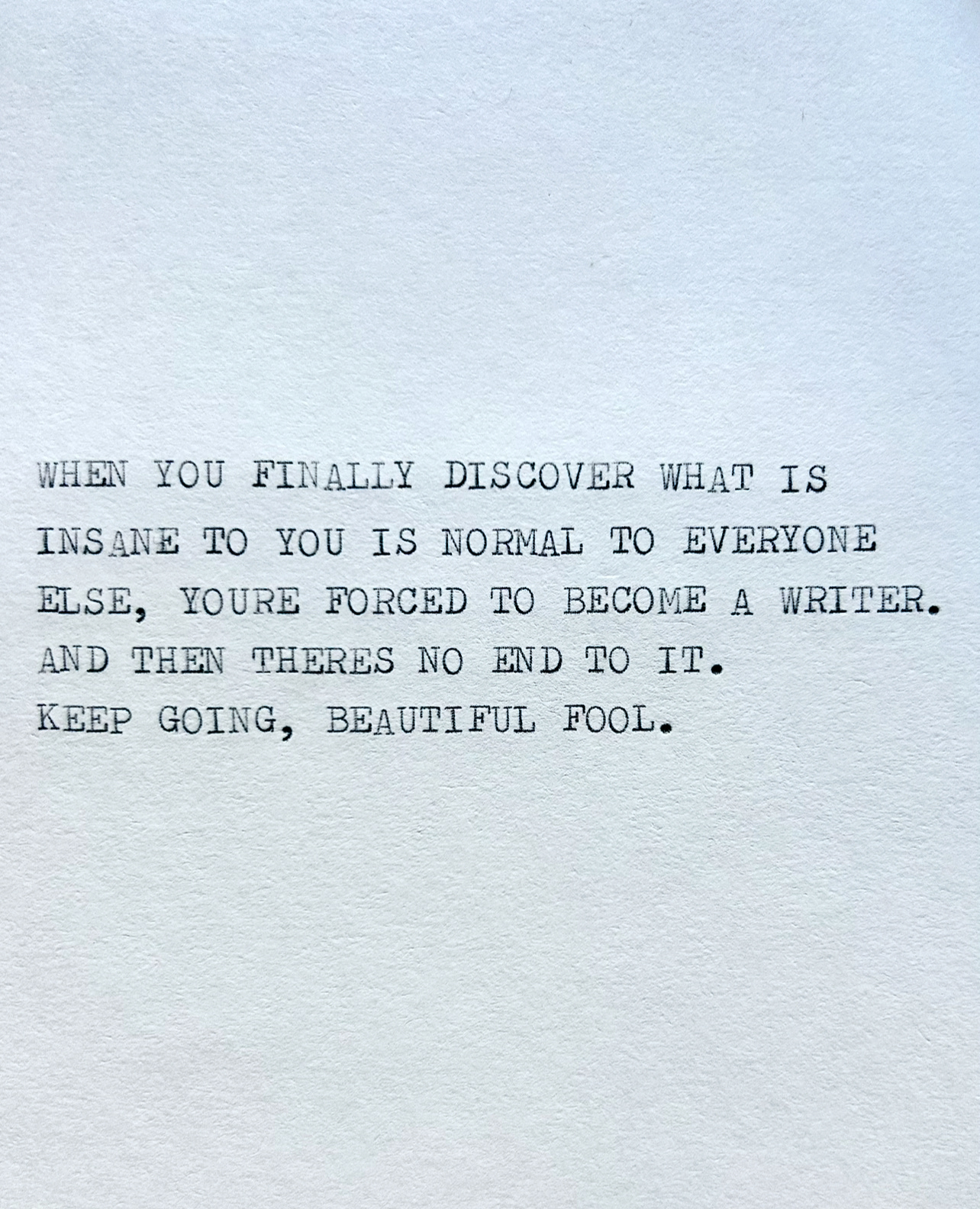
When I was 20 and moved house, I remember opening up an old favourite book in the new place, reading it, and looking up at my new surroundings. And each time I did, the new place felt more and more like home. The power of words to make my heart make the unfamiliar, familiar, was a miracle. And so as I started writing in my late 30s, I felt like I was writing myself into this world. Recently I’ve been considering moving to the other side of the world, and I thought, I could be home anywhere, wherever my writing was. My words are home. While everyone my age invested in property decades ago, I always joked I was investing in intellectual property. Now that feels more true than ever.

Needs no explanation.
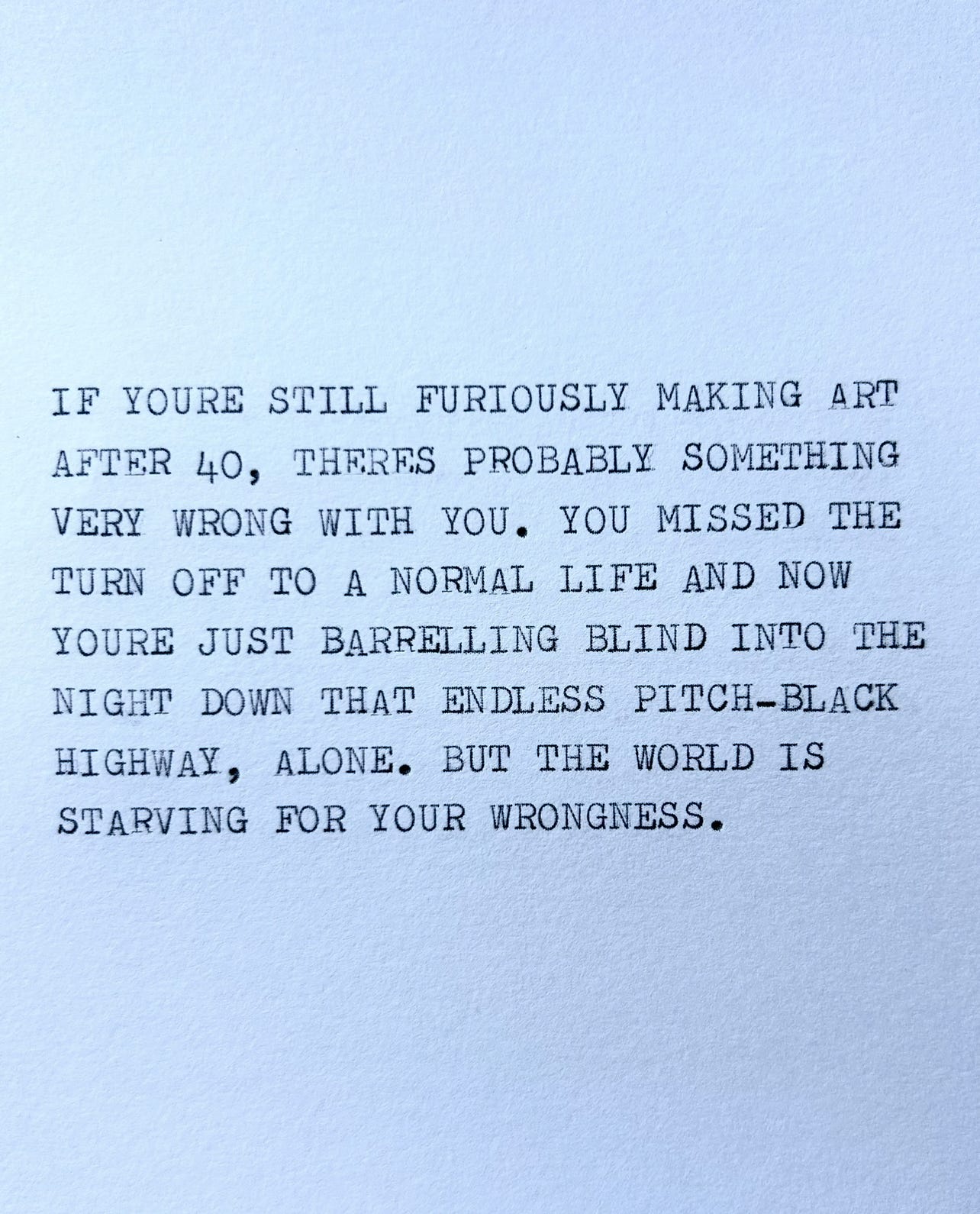
I became so good at one thing, I was stupid at everything else. Most have settled by 40 for obvious reasons, there are forks in the road.
If you’re keen, I crap on a whole lot more about creativity on my podcast “Blah Di Da” (on all streamers)
2nd expanded edition, Darby, Love… (alive things mum said to me before she died)
Hardback, with 38 new quotes, 128 pages. Available to preorder.
Published by Andrews Mcmeel.
Find at: Barnes & Noble, Readings, Amazon, Walmart, Bookshop.org etc

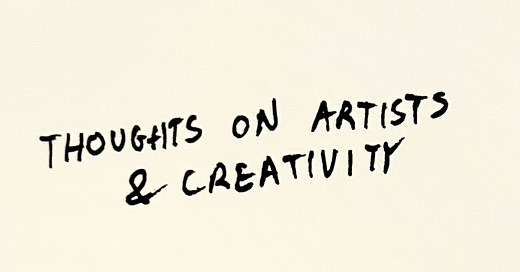



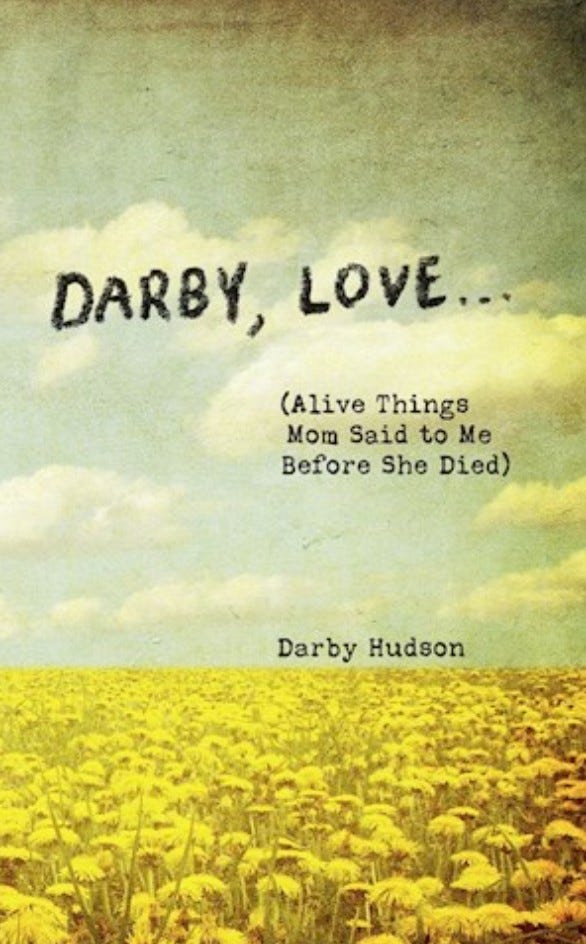
I got so much from this. Encouraging on many levels. Creativity is hard, you're right. I just listened to Jordan Petersons interview with Scott Adams who wrote the Dilbert cartoons - really great listen. Reading this after listening to that has me thinking that I must be on the right track. So many similarities and connecting thoughts from my own to yours, Adams and Jordans. Thank you for putting this stuff out there.